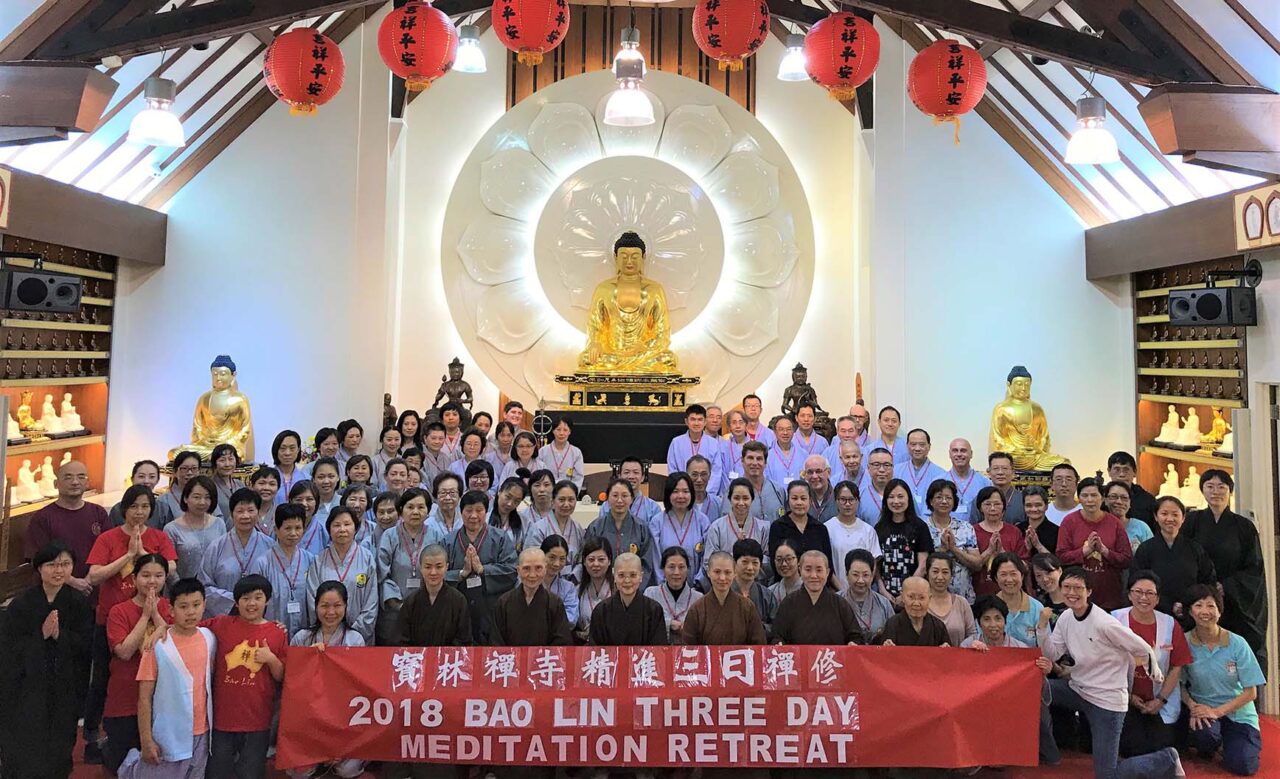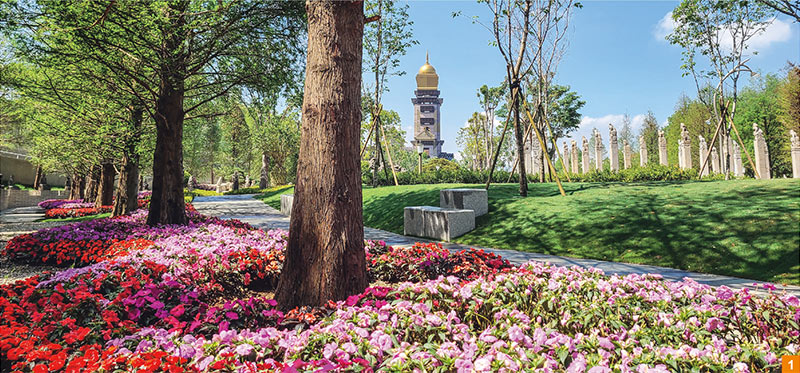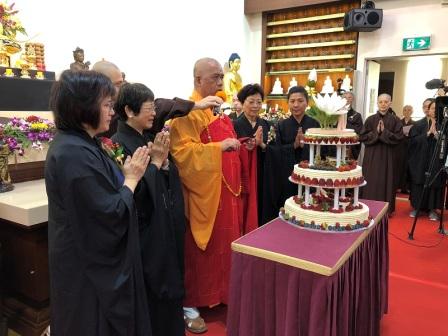Sutra Class/Faith Hawthorne
As the perfect conclusion to 2018, and introduction to 2019, Bao Lin hosted a three day meditation retreat from 29 to 31 December 2018. Due to all the efforts of Shifus and volunteers, we enjoyed three days of noble silence to observe the workings of our mind. The goal: to realise the true nature of our mind, being perfectly pure, everlasting, complete and unmoved.
From the point of initial registration to the concluding meal, all our needs were catered for by Shifus and volunteers. They worked tirelessly to organise our seating and sleeping arrangements, and prepare our meals, creating a peaceful, clean and comfortable environment. We were instructed on when to sit, chant, eat and sleep through Dharma instruments, the distribution of Sutras and lighting of incense. Our photographers recorded this special event. These were the perfect conditions to aid us in our practice. The diligence, sincerity and concentration showed by all Shifus and volunteers was truly very touching – I vowed to treasure every single moment of the three days.
In the initial few days, I had to put in a bit of effort to calm down my mind. Despite my best efforts, I still had some afflictions during sitting meditation, looking forward to meal time and rest. Or over-thinking how I should make the most of these three days:
“Should I do prostrations? Should I rest? Should I continue sitting? Maybe I will go for a walk. It’s such nice weather today. Oh, I could really go another steamed bun – they were so delicious.”
These thoughts were taking me away from truly enjoying the present moment. Realising this, I vowed to be like the turtle in a story recounted by the Abbess in her Dharma Talk. In this particular story, a turtle was resting near some water when it was spotted by a fox. Sensing imminent death, the wise turtle withdrew its head, four legs, and tail into its shell, avoiding the snapping jaws of the fox and saving its life.
The turtle’s head, legs and tail represent our six senses, which come into contact with different phenomena – sights, sounds, smells, tastes, feelings and thoughts. If we continuously abide our mind in these senses, we risk great harm. For all phenomena is subject to the law of impermanence, the fox.
The Abbess’ Dhama talks focused on The Platform Sutra, the teachings of the Sixth Chan Patriarch, Huineng. She detailed the many different methods we can use to cultivate the mind, all having a useful purpose and function. The story of the transmission of the Chan lineage to the Sixth Patriarch illustrates these different methods. Hongren, the Fifth Chan Patriarch, announced he would transmit the Chan seal to the practitioner who wrote a verse demonstrating they had realised the essence of their mind.
Foremost monk, Shenxiu, was regarded as the natural successor. He wrote the following verse:
The body is a Bodhi tree,
The mind a standing mirror bright;
At all times polish it diligently,
And let no dust alight.
While this verse encapsulates the practice of gradual cultivation, an essential aspect of Buddhist practice, it did not demonstrate Shenxiu had realised the essence of his mind.
Unassuming and illiterate practitioner, Huineng, who later became a monk, asked someone to recite Shenxiu’s verse to him. In response, Huineng asked them to write down the following verse:
Bodhi is no tree
Nor standing mirror bright;
Since all is originally empty,
Where does the dust alight?
Upon reading this verse, the Fifth Patriarch privately realised Hui-neng had come to more profound understanding — he had realised the empty nature of all phenomena. This verse encapsulates the practice of sudden enlightenment.
Later, the Fifth Patriarch explained the meaning of the Diamond Sutra to Huineng. In doing so, he instructed Huineng on the most direct method is: let the mind function without abiding. To me, this means not abiding in the idea of cultivation or emptiness — the middle-way reality method. Hearing the Fifth Patriarch’s teaching, Huineng came to a great enlightenment and received the transmission of the Chan seal.
Both these methods of gradual cultivation and sudden enlightenment have a useful function and purpose. We can gradually cultivate, entering through practice, to realise the true nature of our mind, the ultimate principle. Even if we realise the principle — experiencing a moment, or a glimpse, of our fully-enlightened mind — we need to continue our practice, while firmly abiding in our awareness. While we may have realised the essence of our mind, it is like a crescent moon. We still need to cultivate all myriad functions of the mind, letting go of the idea of cultivation, so our mind is like a beaming full-moon. It takes a lot of generosity, discipline, diligence, patience, concentration and wisdom to perfect the practice. It is at this moment, when principle and practice are one and perfect, we will be a Buddha.
Another way of explaining these approaches is to compare different teachings. The approach of many Theravada teachings is to cut off all afflictions, taking them as real. Whereas Mahayana teachings aim to transform all afflictions into wisdom. Chan ultimately regards all afflictions as illusory, knowing that all afflictions and wisdom emanates from the same mind. The mind of great affliction can be the mind of great wisdom. Cessation of delusions is the bodhi mind. All Buddhist teachings — whether Theravada, Chan or other Mahayana teachings — are important, varying only in function, and need to be valued, practiced and perfected.
Of all these different methods, the ultimate truth is that this Buddha nature is intrinsic in all sentient beings. It is not given to us by anyone and it cannot be diminished in any way. It is not greater in the Buddha or sages, nor less in humans or animals. It is equal in all. The only thing that differentiates us is enlightenment, the extent of our wisdom or delusion, which is ultimately illusory.
Since everything comes from this very mind, it is the only thing we can abide in. We can realise our pure mind, our Buddha-nature, by abiding in our awareness — our seeing, our hearing, our smelling, our tasting, our walking and our knowing. In doing so, we need to ignore all our wandering thoughts, our judgements and let go of our attachments to all phenomena — as well as our ideas of the past, future and even the present. These are all delusions. If we can fully abide in our awareness, and let go of our attachments to everything — including the attachment to nothingness — we will achieve purity and perfection. Therefore, we need to be careful not to abide in extreme views, such as nihilism.
This teaching helped me a lot during the retreat. I have a tendency to want to attach to a particular state, wanting to attain perfect stillness during meditation, and I enjoy being in a calm, peaceful environment. As a result, I can get a bit agitated if I have wandering thoughts or pain during meditation, if someone else does something ‘wrong’ or if I’m in a place that is dirty, hectic or loud. I also tend to want to solve problems, or ‘fix’ things or people, by constant thinking. This can be very burdensome and tiring. I also compulsively think about what I’m going to do next, or I worry about the future.
I realised while stilling the mind and perfecting all actions helps us in our practice, it’s important to make sure our attachment to these ideas do not create obstacles. Further, while it’s good to help people, the best way to help is to reduce our attachments, ignore delusions and abide in our awareness as best we can. If we are unable to do this, we need to let this go as well. The state of ‘no-mind’ can also allow us to find solutions and a way forward that we may not have thought of previously. I also realised that, while being organised is a good practice, it’s also really important to appreciate and enjoy the present, and not constantly be seeking for something better in the future.
While it took some effort in the first couple of days to reduce my attachments and wandering thoughts, towards the end of the retreat I started to realise that I actually expend a lot of energy constantly thinking. What results is feelings of stress and dissatisfaction. Once I was able to control my mind and focus on the present moment, I spontaneously felt at ease and joyful. I found the most expedient way to produce this function of the mind, was to realise its essence. The essence of the mind, this ‘knowing’, remained the same irrespective of whether I was feeling stress, dissatisfaction, ease or joy and, therefore, there was no need to attach to any of these feelings.
The realisation that all phenomena — including our fixed ideas of perfection, wisdom or delusion — are all illusory, and that the Buddha-nature is inherent in all, is liberating. Importantly, it can give us the courage and compassion to unceasingly support others in their practice.
I would like to sincerely thank the Buddha; all Chan Patriarchs; Grand Master Wei Chueh; all Shifus and volunteers of Chung Tai Chan Monastery; all Shifus and volunteers of Bao Lin Chan Monastery. It is only through the unending compassion, wisdom and diligence of the Three Jewels that we have this precious opportunity to practice.
Sutra Class/Fa Zhong
Day 1 – Saturday, December 29, 2018
After a night of heavy rain, Melbourne’s early morning was exceptionally clear. The empty street seemed peacefully quiet.
Bao Lin is the first place I have encountered true Dharma, spread in the traditional Zen way — a place outside China, in an English–speaking country. Can you believe it? Life is full of surprises!
Unlike the previous retreat, where I had many pre-conceived expectations, this time I decided just let everything be. Whatever it is, no matter good or bad, just let it be. Let’s see what challenge will come to me this time.
Obviously, if we don’t put in right effort beforehand, there’s a good chance we’ll be unprepared later one. Heat, pain and all sorts of wandering thoughts came to me during meditation — even drowsiness, which I have never experienced before. With all these experiences compounding, I had to move a lot to make myself feel more awake and comfortable. I just told myself:
“It’s fine, never mind. Just try to remain sitting and listening with my legs down.”
Compared to the last time, where I felt like I was sitting on thorns and could have run away at any moment, it’s definitely a step forward this time.
I’ve always loved these words:
“The monkey mind should suddenly stop.”
They perfectly describe the experience of ‘sudden enlightenment’ — where we let go all wandering thoughts without relying on any expedient methods. Just be aware. No matter what thoughts or feelings come, just be aware without paying attention to them. Be clear that there’s not even the thought of ‘clarity’ in the mind — as clear as this morning after the rain.
“Rest in Bodhi mind, rest…”
Day 2 – Sunday, December 30, 2018
These days, people will often go to sleep still holding their mobile phones. In contrast, I didn’t even touch my phone for the whole day! You see? When we alter our thoughts, it’s not difficult to make a change. So I ask you:
“Is it difficult or easy to practice Zen?”
Even though I had quite serious depression for many years, I still pretended to be very confident in the presence of others. All sorts of ‘chicken soups for the soul’ could only warm me up for a little while — they were unable to solve the real problem. In my own studies, when I read about ‘emptiness’ I thought:
“Why to make effort if everything is illusory?”
However, when I learned about the importance of ‘being present’, I started to take every opportunity to enjoy, and get excited about, life. Obviously, I’ve done a lot of bad karma without even realising it. Now, when I look back, I see ignorance.
Incredibly, Shifu’s lecture about “SEE INTO ONE’S TRUE NATURE, ONE BECOMES A BUDDHA.” is a very effective treatment for all my problems, with no side-effects. All of a sudden, I feel as though I’ve been brought back to life and am full of energy. I’m no longer bothered by these big questions about life:
“Who am I? Where am I from? Where am I going? Why did this happen to me? What is the meaning of life?”
Although I have not found all the answers yet, I know that now I’m on the right path:
“To know the cause from the past, we are experiencing the consequence now. To know the consequence in future, we are planting the seed now”.
While we need to be aware of causality, there’s no need to be fearful. We need to let all conditions come and go, like how we deal with our wandering thoughts during meditation. We cannot change what we have done in the past, but we can change our future through the present moment.
There are always learning-curves. I find myself constantly reflecting on Shifu’s teachings:
“If ‘Dharma is people-oriented’, why should we have respect for others?
If ‘everything is the result of Karma’, why should we have compassion?
If we should ‘hold belief in Dharma’, how can we be confident when the Dharma is intangible?
If we should meditate and hold right views to obtain wisdom, how can we persist without attachment?
If everyone is greedy, angry or ignorant, why should we bother changing?
If we all wish to attain sudden enlightenment, why do we still have to make effort to take precepts, meditate and cultivate good deeds?”
Now, I understand we need to show respect and compassion — not only to the Buddha, to Shifu’s, to parents, to all sentient beings — but also to a piece of grass, and even a piece of paper. If we find we have ‘run out our luck’, this may be a fortunate experience, as we can understand the importance of cherishing what we have. If we strictly observe the precepts, it will be easier to achieve ‘定’, and we can increase our wisdom. Similarly, when we have less greed, anger and ignorance, the world will appear a bit different. Cultivate all good deeds, without attachment.
On reflection, I am grateful for all those adversities that appear in life, as they have given me the opportunity to practice and make a difference. Every remarkable transformation requires endurance. Eventually, when we come through hardships, we will experience the beginning of another life. This is also called ‘Nirvana’.
Imagine a life with only good fortune. I ask you:
“Would you say it’s fortunate — or just boring?”
The morning broke with a clap of thunder. Let us be awake and aware.
Day 3 – Monday, December 31, 2018
“Ignore it.”
It sounds unbelievably simple! Shifu sounds very casual when mentioning these very words. This makes me think ‘sudden enlightenment’ should be a pretty easy task. I say to myself:
“Right, there is no other way, or any expedient methods. Just like that — let go all wandering thoughts. Remember that I am the master of this true mind, not you, wandering thoughts!”
When I calm down, I saw the light beams from the sun; I heard the sound of the rain dropping on the leaves; I smelled the fragrance of all sorts of spices; I tasted the delicious vegetarian dishes; I felt the blood flooding in my body like volcanic eruption; I got touched by my high-speed-running thoughts like watching a well-made movie. I thought to myself:
“Have I simply gone crazy? Or are my senses becoming more sensitive?”
If we can be honest with ourselves then we might see our true self.“This is amazing! It seems that I’m closer to the ‘awareness’, the ‘true mind’.”
Oh, do not forget — the true mind is from within not without!
Past thoughts are intangible, no matter how deeply ingrained the memory. It has passed — so do not let it become another obstacle to the present. future thoughts are intangible, no matter how sure we are about the future. It is still not 100% certain — so leave it as a surprise in the future.
When we were advised “present thoughts are intangible” my initial reaction was “Um, this is difficult” “The mind should act without any attachments.”. Shifu reassured us:
Just know that all phenomena are illusory. No grasping, no controlling. This is your Bodhi mind. When at rest, rest all thoughts. When in action, perfect all actions.
Let us always abide in this awareness — let go what should be let go and maintain what should be maintained — so you can meet the best self that you wish to meet in the future.
While ‘riding the ox home’, I realised the unbearable smell from last night turned out to be quite fragrant. You see?
“A simple change in mind can turn the hell into a pure land.”
Three-day meditation retreat, twenty-four incenses, no thoughts remain, neither good or bad.
It started in a thunderstorm but ended in clear skies.



